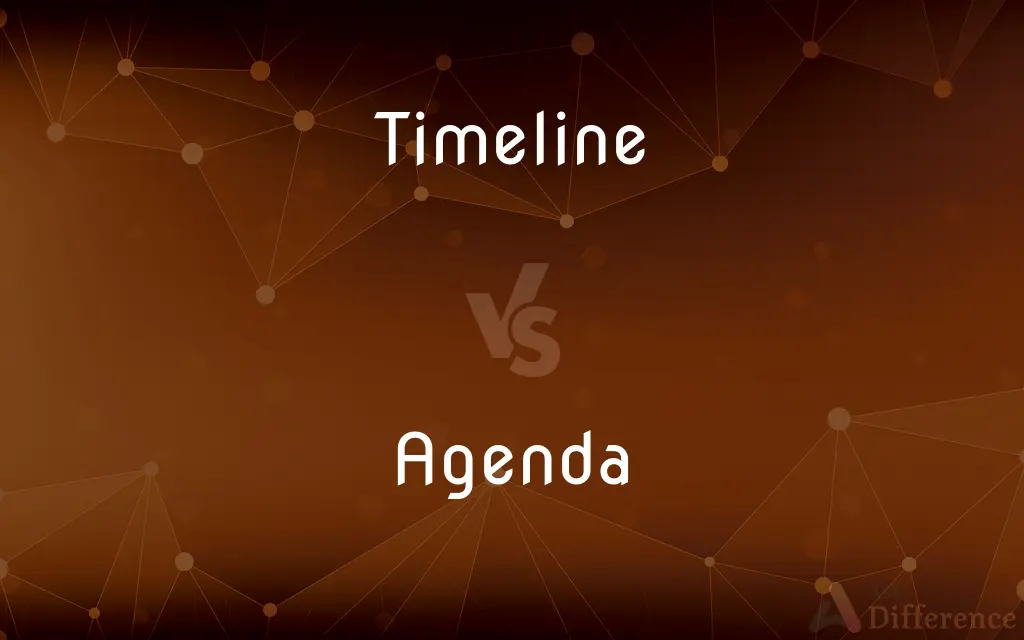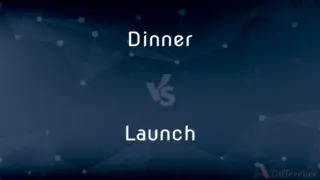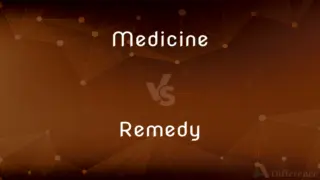Timeline vs. Agenda — What's the Difference?
Edited by Tayyaba Rehman — By Urooj Arif — Updated on March 12, 2024
A timeline represents a chronological sequence of events, focusing on when they occurred, while an agenda lists tasks or topics for discussion, emphasizing what will be addressed.

Difference Between Timeline and Agenda
Table of Contents
ADVERTISEMENT
Key Differences
A timeline is a representation of events in the order they happened over a period, often used to visualize historical events, project milestones, or personal achievements. It serves as a visual representation of temporal data, highlighting the sequence and duration of events. Whereas an agenda outlines a list of items to be discussed or accomplished during a meeting or event, focusing more on the content and order of activities rather than their temporal relations.
Timelines are particularly useful for understanding the context and sequence of events, making it easier to analyze patterns, causes, and effects over time. They are essential in fields such as history, project management, and education. On the other hand, agendas are crucial for planning and conducting meetings efficiently, ensuring that all necessary topics are covered and objectives are met within the allotted time.
While a timeline is often depicted graphically, with lines and markers denoting points or periods in time, an agenda is typically presented in list form. This format difference highlights the timeline's focus on the visual depiction of time and events, whereas the agenda emphasizes the structured layout of discussion or action items.
Timelines can span across various scales, from days to centuries, providing a macro or micro perspective of events based on the scope of interest. Meanwhile, agendas are generally confined to the duration of a specific meeting or event, focusing on the immediate or short-term timeframe.
In educational settings, timelines aid in teaching historical events, processes, or sequences, helping students grasp the chronological order and timing of occurrences. Agendas, however, are used in both educational and professional settings to organize meetings, lectures, or workshops, prioritizing discussion points or activities to ensure comprehensive coverage and effective time management.
ADVERTISEMENT
Comparison Chart
Purpose
To display events in chronological order
To list items for discussion or completion
Focus
When events occurred
What will be discussed or done
Representation
Graphical, with lines and markers
List form
Use Case
History, project management, education
Meetings, conferences, workshops
Temporal Scope
Can span from days to centuries
Usually confined to a single meeting or event duration
Compare with Definitions
Timeline
A feature in software that organizes tasks or updates chronologically.
The social media platform introduced a new timeline feature for posts.
Agenda
An outline of topics for a conference or symposium.
Attendees received a detailed agenda upon registration.
Timeline
An educational resource for teaching historical sequences.
The teacher used a timeline to explain the civil rights movement.
Agenda
A plan of things to do or problems to address.
The conference had a packed agenda of workshops and talks.
Timeline
A tool for planning and tracking the stages of a project.
The project manager outlined the development process on a timeline.
Agenda
The underlying intentions or motives of a person or group.
Critics questioned the politician's agenda behind the policy.
Timeline
A graphical representation of events in chronological order.
The museum displayed a timeline of the war's major events.
Agenda
A tool for organizing and prioritizing tasks.
She checked her agenda for the day's appointments.
Timeline
A sequence of significant events in a particular domain.
The documentary featured a timeline of technological innovations.
Agenda
A list of items to be discussed in a meeting.
The chairperson distributed the meeting agenda in advance.
Timeline
A timeline is a display of a list of events in chronological order. It is typically a graphic design showing a long bar labelled with dates paralleling it, and usually contemporaneous events.
Agenda
A list of things to be discussed in a meeting.
Timeline
A schedule of activities or events; a timetable.
Agenda
A program of things to be done or considered
"King's broadening of the civil rights agenda to include issues of class, income, and employment" (James Carroll).
Timeline
A chronology.
Agenda
(Informal) A usually unstated underlying motive
"Everyone has an agenda, whether he or she is honest about it or not" (Ted Nordhaus and Michael Shellenberger).
Timeline
A representation or exhibit of key events within a particular historical period, often consisting of illustrative visual material accompanied by written commentary, arranged chronologically.
Agenda
A datebook
Bought a leather-bound agenda.
Timeline
A graphical representation of a chronological sequence of events (past or future); a chronology.
Agenda
A plural of agendum.
Timeline
A schedule of activities; a timetable.
Agenda
A temporally organized plan for matters to be attended to.
Timeline
(scifi) An individual universe or reality, especially a parallel/alternate one in which events differ from actual history, or differ from the established canon of a fictional world.
Agenda
A list of matters to be taken up (as at a meeting).
Timeline
To analyse a sequence of events or activities.
Agenda
A notebook used to organize and maintain such plans or lists, an agenda book, an agenda planner.
Timeline
To display such a sequence graphically.
Agenda
An ulterior motive.
Agenda
(obsolete) A ritual.
Agenda
Plural of agendum
Agenda
A temporally organized plan for matters to be attended to.
Agenda
A list of matters to be discussed (as at a meeting).
Agenda
A motive or set of goals; as, to have one's own agenda;
Agenda
A temporally organized plan for matters to be attended to
Agenda
A list of matters to be taken up (as at a meeting)
Common Curiosities
Are agendas only for professional settings?
No, agendas can be used in any setting where a structured list of topics or tasks is beneficial, including educational and personal settings.
Is a timeline static or can it be updated?
Timelines can be updated as new events occur or more information becomes available.
What is the main difference between a timeline and an agenda?
A timeline organizes events chronologically, while an agenda lists items for discussion or completion.
Can a timeline and an agenda be used together?
Yes, in project management, a timeline can outline the project's phases, and an agenda can detail the discussions in meetings throughout the project.
Why is an agenda important for meetings?
An agenda ensures that all necessary topics are discussed and objectives are met efficiently during a meeting.
Can agendas have a temporal element?
Yes, while agendas focus on what will be done, they also include time allocations for each item to manage the duration of a meeting or event.
Who benefits from using an agenda?
Meeting participants, event organizers, and individuals looking to structure their tasks or discussions can benefit from using an agenda.
How do timelines help in education?
Timelines help students visualize and understand the sequence and timing of historical events or processes.
Can a timeline span beyond years into centuries?
Yes, timelines can cover any range of time, from days to centuries, depending on the events being represented.
How does a timeline differ visually from an agenda?
A timeline is typically graphical, with lines marking events in time, whereas an agenda is presented in list form.
Can a timeline be used in project management?
Yes, timelines are crucial in project management for planning, tracking, and visualizing the stages of a project.
What kind of events can be included in a timeline?
A timeline can include any significant events, such as historical occurrences, project milestones, or personal achievements.
How does an agenda help in time management?
By outlining a structured list of topics or tasks, an agenda helps ensure that a meeting or event stays on schedule.
What makes an agenda effective?
An effective agenda is clear, structured, and prioritizes items to ensure that all topics are addressed within the allotted time.
How do educators utilize timelines?
Educators use timelines to teach students about historical sequences, helping them understand the context and timing of events.
Share Your Discovery

Previous Comparison
Dinner vs. Launch
Next Comparison
Medicine vs. RemedyAuthor Spotlight
Written by
Urooj ArifUrooj is a skilled content writer at Ask Difference, known for her exceptional ability to simplify complex topics into engaging and informative content. With a passion for research and a flair for clear, concise writing, she consistently delivers articles that resonate with our diverse audience.
Edited by
Tayyaba RehmanTayyaba Rehman is a distinguished writer, currently serving as a primary contributor to askdifference.com. As a researcher in semantics and etymology, Tayyaba's passion for the complexity of languages and their distinctions has found a perfect home on the platform. Tayyaba delves into the intricacies of language, distinguishing between commonly confused words and phrases, thereby providing clarity for readers worldwide.
















































